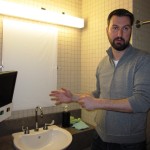
Dr. Alex Mihailidis: the ‘talking bathroom guy’
When you design assistive technologies to help adults with cognitive difficulties live more independently, you have to know what users need. That sounds simple but we really know so little about this.
What social-demographic factors affect their decisions about how to use the technology and when? Does their level of education, age, culture or religion have an effect?
These are brand new questions. Most developers aren’t even thinking about this. It’s not surprising then that nine out of 10 devices meant to prompt daily tasks such as hand washing or meal preparation are abandoned after a short period of time.
So what do people using these technologies need?
For some cultures, there is still a stigma about dementia, so any assistive technology we design has to be unobtrusive if caregivers are going to use them.
And of course, dementias such as Alzheimer’s disease are not static. People’s symptoms change over time and the artificial intelligence we build into these devices has to adapt with them.
But we need to know more. That’s why I’m looking forward to results from a research project we just launched with funding from the Alzheimer Society of Canada. We will survey about 500 caregivers in Toronto, using questionnaires, focus groups and interviews.
We plan to share the resulting guidelines on a website that both technology designers and the public can access.
While the technology involved in designing these devices can be exciting, we really need to be motivated by meeting the needs of caregivers and those with cognitive difficulties.
To read more about Alex, visit our research pages.
Alzheimer Society Research Program funded researcher
